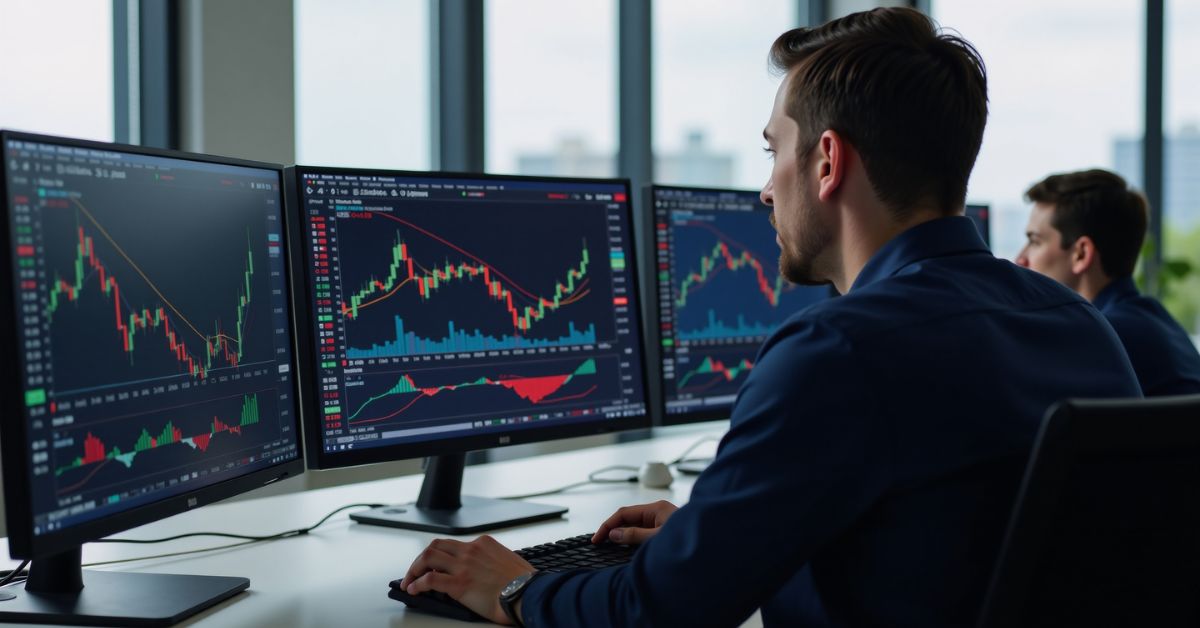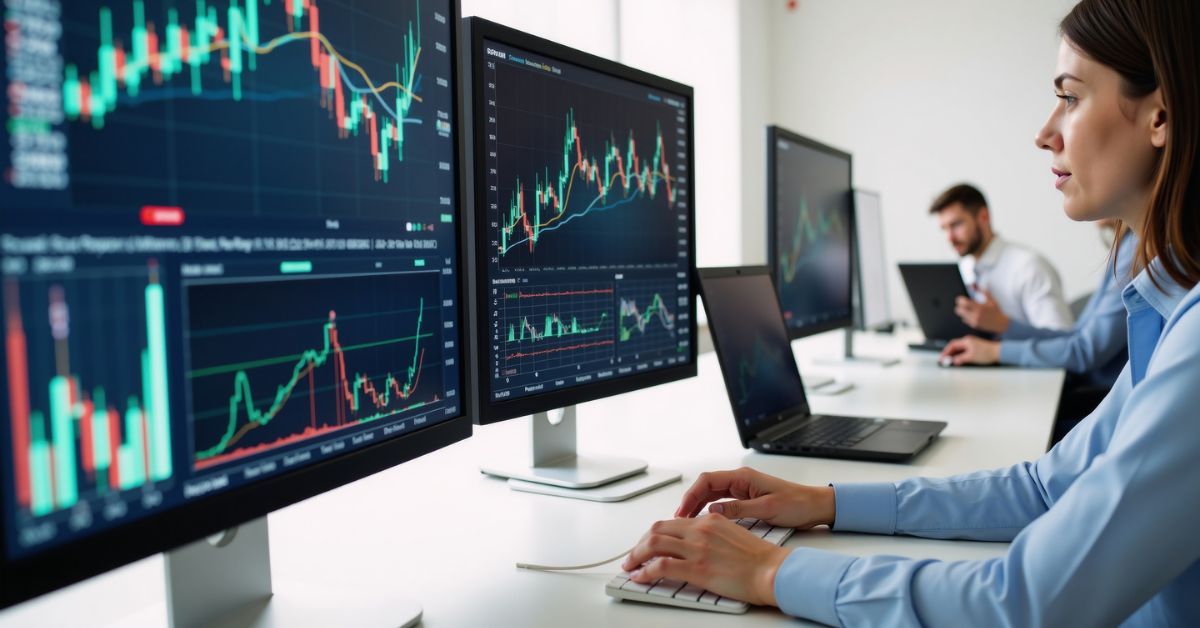Overconfidence in trading can lead to costly mistakes. Many traders feel unstoppable after a few successful trades, but this mindset often ends in losses. When you’re too confident, you might take bigger risks or ignore warning signs, thinking you’re immune to market surprises. Making informed, balanced decisions requires managing overconfidence. In this guide, we’ll explore how to fix overconfidence in trading, from creating a trading plan to managing emotions. Staying confident will help you trade smarter and build long-term success.
Using the right tools can make a huge difference in trading responsibly. Platforms like Prime XBT offer reliable resources and analytics to help traders stay grounded. Access to accurate market data and trading tools allows you to make decisions based on facts, not just feelings. So, join PrimeXBT today! Use promo code PRIMEOTT to receive a +7% bonus on your deposit.
What is Overconfidence in Trading?

Overconfidence in trading is the tendency for traders to overestimate their skills, knowledge, or control over the market. This often occurs after a streak of successful trades, leading to a belief that their decisions are foolproof. Familiarity with market trends can also make traders feel overly secure, ignoring potential risks.
Common Cognitive Biases
Several cognitive biases contribute to overconfidence. For example, the Dunning-Kruger effect describes a situation where individuals with limited knowledge overestimate their abilities. In trading, this means that newer or less skilled traders might feel more confident than experienced ones. Hindsight bias is another common factor. It occurs when traders believe market trends are predictable only after they occur, reinforcing a false sense of control.
What are the Risks of Overconfidence in Trading
Overconfidence can create costly risks for traders. Recognizing these can prevent unintentional financial loss and stress.
Increased Risk-Taking
Overconfident traders often take on too much risk. This includes placing larger trades or using high leverage, which can worsen losses if the market moves unfavorably. Studies suggest that overconfident traders may overestimate their skill in predicting market trends, leading to excessive exposure.
Ignoring Risk Management
Overconfidence can cause traders to skip essential risk management tools, such as stop-loss orders and portfolio diversification. Many overconfident traders also dismiss market warnings. Research shows these behaviors can lead to substantial losses. Without effective risk management, traders may face unexpected downturns.
Emotional Impacts
Overconfidence can lead to emotional trading, which can be highly reactive. For instance, overconfident traders may double down after a loss, trying to recover quickly. This can cause stress and lead to burnout over time.
How to Fix Overconfidence in Trading

Trading requires self-awareness, so you know your strengths and weaknesses. This prevents impulsive choices based on overconfidence.
Self-Assessment Techniques for Traders
Consistently evaluating past trades builds realistic self-awareness. Maintaining a trading journal helps track wins, losses, and emotions during trades. Review each trade with questions like, “Did I follow my plan?” and “What did I learn?” This prevents repeating errors due to overconfidence.
It is proven that successful traders use self-assessment tools, including performance trackers and journals. Self-evaluation also reveals patterns, like common mistakes or emotional triggers, helping traders set improvement goals.
Recognize Cognitive Biases
Overconfidence often stems from cognitive biases, such as the Dunning-Kruger effect, where people overestimate their expertise. A string of wins can make traders feel untouchable, leading to risky choices. Recognizing biases like this reduces overconfidence and promotes realistic thinking. According to psychologists, actively identifying and countering these biases helps in making informed decisions.
Embrace Uncertainty
Accepting uncertainty is essential in trading since markets are unpredictable. Recognize that no trader can accurately predict every market movement. This mindset, known as “intellectual humility,” allows traders to avoid high-stakes gambles. Market experts often remind traders to set stop-loss limits and diversify to manage risk better. This approach lowers the impact of unforeseen losses.
Developing Mindfulness Skills
Mindfulness encourages traders to pause and consider their choices before acting. Short mindfulness exercises, like deep breathing, reduce impulse reactions. Research from the American Psychological Association suggests mindfulness reduces impulsive decisions, which overconfident traders often make. Studies show mindfulness improves focus and decision quality.
For example, a trader feeling overly optimistic might double their investment size. A mindful approach encourages taking a moment to review the plan, reducing excessive risks.
Building a Disciplined Trading Plan
A structured trading plan can help traders avoid emotional decision-making and reduce the risks of overconfidence in trading. It provides clear rules and guidelines to follow in different market situations, reducing impulsiveness and enhancing consistency.
Setting Clear Rules
A trading plan should include rules for when to enter or exit trades. These rules should be based on analysis. Traders should establish conditions that must be met before executing a trade. For example, waiting for market conditions to meet specific criteria before making a move. This strategy keeps emotions out of the decision-making process.
Traders with clear rules are more successful than those without a plan. A defined strategy helps avoid actions based on emotions or overconfidence.
Implementing Risk Management Strategies
Risk management is a key element of any trading plan. Without it, traders may take excessive risks based on overconfidence. This can include increasing position sizes or using high leverage. Setting stop-loss orders can help limit potential losses.
For example, a stop-loss order might close a trade if the price drops 5%. This stop-loss calculator can help you to make the right decision. Check out our On Tilt Trading Store for a reliable stop-loss calculator that can help you manage your risk better.
Risk management also involves controlling position sizes. Risking more than 2% of your capital on a single trade can be dangerous. Diversifying investments across different assets further reduces risk exposure. Traders with proper risk management techniques are more likely to succeed.
Adjusting the Plan When Necessary
Markets are always changing, and so should your strategy. A trading plan must remain flexible to account for shifting conditions. Regularly review your trading performance and make adjustments as needed. If a strategy isn’t working, make changes to improve results.
For example, during high volatility, traders might choose to reduce position sizes to limit exposure. This flexibility prevents losses from compounding.
The Role of Backtesting
Backtesting is an important part of any trading plan. It involves testing your strategy using past market data to identify potential issues before investing real money. This allows for improvements and increases confidence in the strategy.
The traders who backtest their strategies earn better returns. Backtesting reveals whether a plan is likely to work under current market conditions.
Staying Disciplined and Avoiding Emotional Trading

Discipline is essential to successful trading. Emotional trading can lead to poor decisions and large losses. Overconfidence can make traders feel invincible, leading to higher risks. To maintain discipline, always stick to the rules of your plan. Review the plan before making each trade to ensure consistency.
A consistent review process helps prevent impulsive decisions during periods of success or failure. Always take the time to reflect before acting.
Continuous Learning and Adjustments
A trading plan should evolve as you gain more experience. Keep learning by attending webinars, reading books, or joining forums. The more knowledge you gain, the more you can improve your plan. Staying up to date with new strategies is key to continued success.
Maintaining a trading journal can help track progress. Documenting lessons learned can reveal areas for improvement, allowing for better decisions in the future.
Developing Emotional Intelligence and Mindfulness
Emotional intelligence (EQ) plays a significant role in making rational decisions while trading. Recognizing emotions like fear or greed can prevent rash decisions. Overconfidence can also lead traders to take excessive risks. The more emotional intelligence you have, the better you’ll be at managing your reactions and staying focused.
Managing Emotions
Emotional intelligence helps traders identify and regulate their emotions during trades. Traders with high EQ understand when to step back and avoid emotional decisions. This reduces the impact of emotions like greed or fear, which could cloud judgment. Research by the Journal of Behavioral Finance suggests that emotional intelligence helps traders avoid impulsive, costly mistakes.
Mindfulness Practices
Mindfulness techniques help traders become more aware of their thoughts and feelings during market fluctuations. Simple practices, like meditation and deep breathing, can create a calm mindset. Mindfulness fosters clarity and helps traders avoid hasty, emotional reactions.
Studies show that mindfulness reduces stress and enhances decision-making. For example, a study by the National Institutes of Health found that mindful people tend to make more thoughtful, less impulsive decisions.
Meditation for Traders
Meditation helps reduce stress and sharpen focus. Spending just 10 minutes daily on meditation can improve decision-making. It also helps clear the mind, making it easier to process market information calmly. Research from Harvard Medical School suggests that meditation helps regulate emotions and promotes clarity under pressure.
Journaling for Emotional Reflection
Journaling is another effective way to improve emotional awareness. Writing down your thoughts after each trade helps you recognize patterns in decision-making. Reflecting on these thoughts can reveal emotional triggers, leading to better future choices.
The Journal of Financial Planning suggests that traders who journal perform better and make fewer emotional decisions. It helps traders learn from their mistakes and refine their strategies.
The Benefits of Emotional Regulation
Regulating emotions reduces stress and enhances cognitive function. Emotional regulation prevents fear and greed from influencing decisions. A report from the American Psychological Association emphasizes that emotional regulation boosts decision-making skills.
Traders who can control their emotions are less likely to make rash decisions during market volatility and more likely to follow their trading plans, leading to long-term success.
Recognizing and Countering Cognitive Biases

Cognitive biases, such as confirmation bias, often fuel overconfidence in trading. Recognizing these biases helps traders make more informed decisions.
Confirmation Bias
Confirmation bias occurs when traders only seek information that confirms their beliefs. This reinforces overconfidence and can lead to poor decision-making. To counter this, traders should actively seek diverse perspectives and data that challenge their assumptions. Research shows this approach leads to more balanced decision-making (Journal of Behavioral Finance).
Continuous Learning
The markets are constantly changing, so traders must embrace continuous learning. Staying updated on market trends and strategies reduces biases and improves trading decisions. Studies show that successful traders engage in ongoing education to adapt to evolving market conditions (Financial Planning Association).
Avoiding Overconfidence Traps
Overconfident traders may take excessive risks by ignoring stop-losses or increasing their position sizes. To combat this, traders should remain humble and aware of market unpredictability. Research indicates that humility and self-awareness can help reduce the impact of overconfidence (CFA Institute).
Objective Analysis
Regular performance reviews can help traders identify patterns of overconfidence and improve decision-making. Using tools like trading journals can provide valuable insights, separating emotions from analysis.
Monitoring and Reviewing Trading Performance
Regular performance reviews are key to controlling overconfidence. Reviewing past trades helps you understand what worked and what didn’t.
Regular Performance Reviews
Analyzing your trading history can provide valuable insights. It helps identify patterns, strengths, and weaknesses. Research shows that traders who review their performance regularly are more likely to make informed decisions and avoid emotional mistakes (CFA Institute).
Reviewing both wins and losses can help traders gain a balanced perspective. This process helps curb the temptation to become overconfident after a string of successes and keeps trading strategies grounded in reality.
Learning from Mistakes
Mistakes are inevitable in trading. However, learning from them is vital for long-term success. Successful traders view mistakes as opportunities for growth. Research shows that traders who analyze their errors show better performance over time (Journal of Financial Economics).
Instead of treating losses as failures, approach them as learning experiences. This mindset shift can reduce overconfidence and improve decision-making in future trades. Making mistakes allows you to refine your approach, resulting in more disciplined and effective trading.
Read More: How To Identify Overconfidence In Trading
Conclusion
Overconfidence in trading can be dangerous, leading to impulsive decisions and unnecessary risks. The better you know yourself, the clearer rules you set, and the more you learn, the better your choices will be. Regular performance reviews and learning from mistakes are also vital to overcoming overconfidence.
If you’re tired of losing money due to panic selling, FOMO, or overtrading, consider using the Vestinda trading app. Vestinda can eliminate emotional decision-making and reduce overconfidence, leading to more consistent and profitable trading results. Start trading smarter today!



